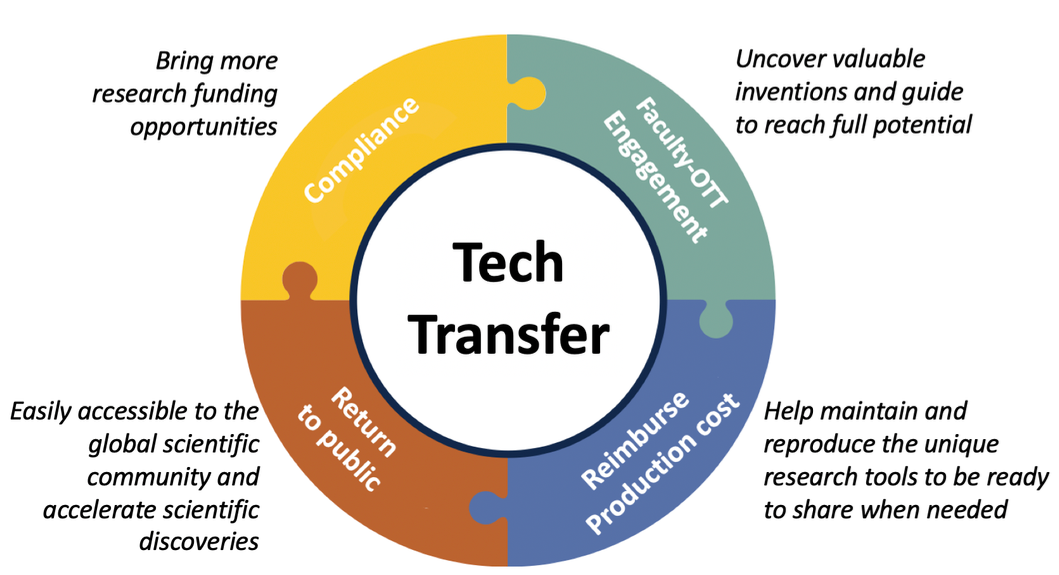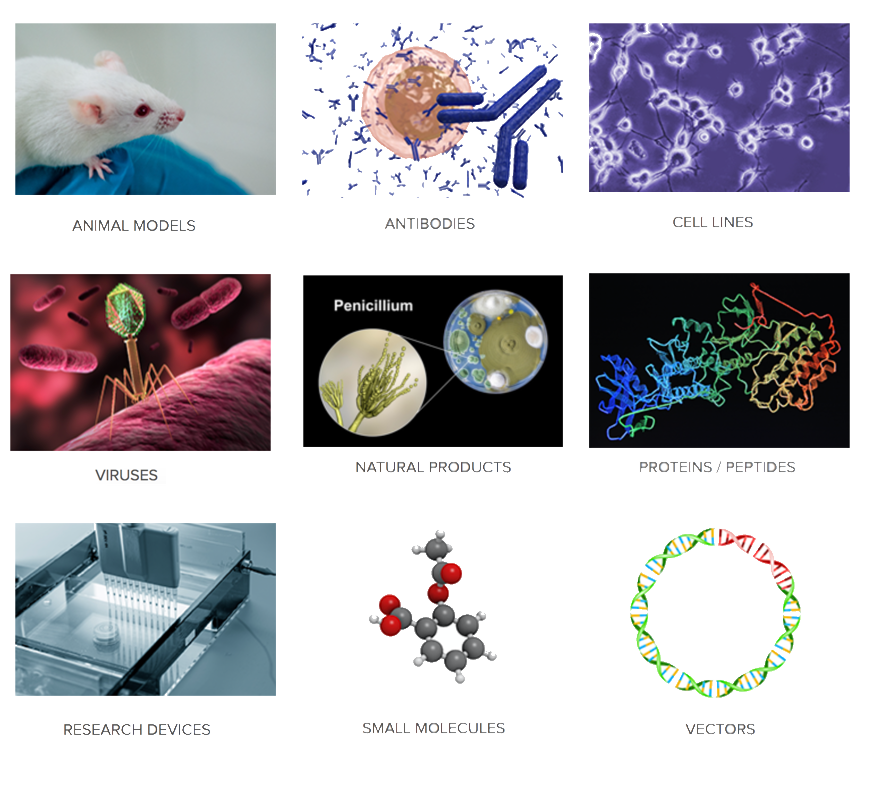You are here
Policies for sharing Research Tools and Biomaterials
To accelerate scientific discoveries and to benefit the greater research community, principal investigators and funding recipient institutions are expected to ensure broad and timely dissemination of their research resources. Failure to share these can lead to unnecessarily duplicative research and delays in scientific innovation.
What are Research Tools and Biomaterials?
- antibodies, peptides and engineered proteins
- small molecules, antisense oligonucleotides
- research reagents
- expression plasmids and proteins derived from them
- cell surface receptors
- cell lines
- animal models (e.g., knockout mice)
- research devices
Other research resources or materials include biological or other materials that are:
- primarily useful for research purposes, such as in data related to the elucidation of disease mechanisms or to drug discovery;
- finished products that often do not require further development time and development costs in order to be utilized; or
- broadly enabling inventions, useful in developing multiple products in numerous disciplines, rather than a single project-specific or product-specific use.
What are a Project Team's Obligations with Research Tools?
Principal investigators and institutions that receive federal research funding are expected to disseminate research resources (research tools) broadly and in a timely manner. Failure to share these research tools can lead to unnecessarily redundant research and delays in scientific innovation.
U-M Guidelines for Compliance
Ease of Sharing
U-M Innovation Partnerships has partnerships with third-party partners who can assist U-M researchers in maintaining and providing research tools to parties requesting access. This eliminates the burden on researchers having to produce and ship research tools every time a request is made. Therefore, by disclosing your research tool to Innovation Partnerships, you can off-load having to respond to future requests while better enabling the research community to access your tools.
Value of Research Tool Sharing

U-M Innovation Partnerships can help
U-M Researchers can submit and share their research tools via U-M Innovation Partnerships' online innovation disclosure form. Click the Online Report Submission button to access the disclosure reporting system. Alternatively, a Word version of the Research Tool or Biomaterials Report can be downloaded and emailed to innovationpartnerships@umich.edu (link sends e-mail) (link sends e-mail). U-M Innovation Partnerships then works with investigators to add disclosed resources to a Research Tool Portfolio and recommends dissemination strategies. If you have questions or need further assistance, please call U-M Innovation Partnerships at 734-763-0614.
FAQs
Any research materials created in the performance of the project is an Invention.
Yes. Under the terms of most funding agreements, researchers have an obligation to promptly disclose whether a patent is being sought or not. A Biological Material/Research Tool Report is required for all research tool inventions and developments. These may accelerate someone else’s research, therefore, promote scientific innovation.
Typically, research tools are materials such as antibodies, vectors, plasmids, cell lines, mice, and other materials used as “tools” in the research process. These are sometimes referred to as research resources, research materials, or tangible research property.
If you have research tools that you believe to be valuable or wish to provide for others (including research collaborators), IP will work with you to develop the appropriate protection, licensing, and distribution strategy.
It is a written description of your invention or development provided to IP. The report refers to all sources of support and includes information necessary to begin pursuing dissemination and commercialization activities.
To initiate the process, submit the report online at https://innovationpartnerships.umich.edu/for-inventors/submit-your-innov....
Yes, as long as the quality is regulated while stored an extended period of time.
Your research tool will be promoted to the U-M research tool portfolio and to a third-party marketing site with a one-click purchase option. Webpage links will be shared with you so that you can reference them on your laboratory website and provide it to any requestor. The rest will be taken care of by U-M Innovation Partnerships. If there are questions, you will be contacted by the assigned licensing specialist to discuss the invention and its potential commercial applications.
Yes, depending on what dissemination strategy is chosen either licensing revenue or production cost (material fee) can be reimbursed to the laboratory.
Anytime if it is a finished material to disseminate regardless of publication status.
Because research tools do not necessarily need to be protected by patents to be licensed to commercialize and generate royalties for the laboratory.
If possible should provide a supporting reference demonstrated the production and validation of the research tool. This delivers value to scientists who wish to use your reagent in their own experiments by providing a method for experimental reproducibility.
References and Resources
- NIH Research Tools Policy (link is external) Federal Register notice on Principles and Guidelines for Recipients of NIH Research Grants and Contracts on Obtaining and Disseminating Biomedical Research Resources: Final Notice
- NSF Research Tools Policy (link is external) Dissemination and Sharing of Research Results
- EPA Research Tools Policy (link is external) Scroll to see PDF of EPA General Terms and Conditions Effective October 1, 2018.
- Howard Hughes Medical Institute (HHMI) policy: Sharing Published Materials/Responsibilities of HHMI Authors (link is external)
- Research Tool/Biomaterial disclosure form Link to U-M Innovation Partnerships' online innovation disclosure form (https://innovationpartnerships.umich.edu/for-inventors/submit-your-innovation/). Click the Online Report Submission button to access the disclosure reporting system. Alternatively, a Word version of the Research Tool or Biomaterials Report can be downloaded and emailed to innovationpartnerships@umich.edu(link sends e-mail). Contact U-M Innovation Partnerships at 734-763-0614.
Questions?
Contact U-M Innovation Partnerships with questions at innovationpartnerships@umich.edu (link sends e-mail) or 734.763.0614.
